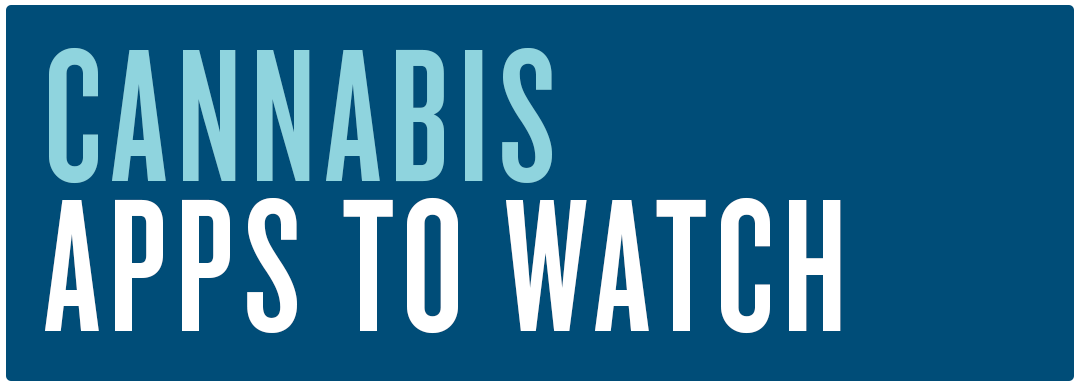
In the old days, “cannabis tech” might have meant pulling out a pager number or getting a callback from your dealer’s burner phone. Today, there are almost limitless tools, applications and platforms to help new patients, seasoned enthusiasts, and industry experts alike learn and connect over cannabis culture. So if you’re a medical marijuana user who could use some virtual, on-the-go support, check out these products.

New apps with slick design and simple sign-ups make it fast and easy for marijuana consumers of all experience levels to source doctors, delivery services, information, friendships—and even nearby deals and opportunities.
Richard S. Sanchez, founder and author of The Kush Chronicle, says the world of cannabis apps is one of the fastest-growing in tech right now. “Not only do you have the familiar, one-stop-shop apps—that of course are all in the race to become the next ‘Amazon’ of weed—there are also some really interesting, more specialized up-and-comers from recently-legalized states to watch.”
However, with the federal ban still hanging over them, many companies are staying focused on their state or local users. “The idea being that with legalization, these businesses will be able to ramp quickly to a national audience,” says Sanchez.
Whether all-in-one hubs or niche tools, we’ve seen a bumper crop of new web and mobile applications. “And, no doubt, these tools will only get better and better,” Sanchez predicts. Here are 12 new cannabis apps to keep your sights on, if not to download now.

Particularly helpful to newbies, Releaf is a free journaling app that’s a whole lot more than just a note-taker. With a library of commonly described benefits, it features a quick-start way to record your own experiences and tag both physical and emotional side effects. Your personalized log can even help you pinpoint new strains to try—and ones to avoid.
Which is incredibly important right now, Sanchez reminds us. He recounts the story of Adam, whose wife suffered seizures after being prescribed marijuana to help ease the side effects from her chemotherapy treatment. Because of his careful note-taking, he was quickly able to discover how it was a particular terpene, and not marijuana itself, causing the seizures. “Patients have to be their own advocate—not only because everyone’s reactions to different plant medicines can vary wildly, but also because patient experience is far outpacing the research at this point.”

Helping to close that gap is a Canadian app primarily focused on medical patients, Lift & Co. The app’s main draw is its huge, ever-expanding database of more than 50,000 product reviews, not just of cannabis strains but of related products, concentrates, and licensed accessories, a resource with huge global appeal, Sanchez says. The company achieves its high rate of user participation by offering perks to consumers like user points for completing surveys and product reviews and invites to Lift-sponsored events.
Oh, and don’t forget: MarijuanaDoctors.com, does also offer an app, that provides a vast resource for patients (and doctors), offering guidance on qualifying medical conditions, strain recommendations, dispensaries, and even a step-by-step guide on how to apply for your medical marijuana card.

For all the latest in current events regarding hemp and cannabis, check out an app called Hemp IM, which provides breaking news and market analysis, trends to watch, and all the latest state and federal regulatory information.

Though MassRoots is often called a social network for cannabis-lovers, the app also allows users to source, read, create, and share content, making it a hub for media, news, and cannabis culture. It’s the only network of its kind being traded on Wall Street right now, which means that, at least to industry insiders, the app has managed to, well, take root.

For growers, or for those who want to be, SimLeaf offers users a fun and educational way to experiment with seedlings in a virtual grow room, toying with environmental variables like soil condition, water nutrients, sunlight—even your own start-up budget.

Or, if you’re ready to try the real thing, Grobo’s (or Citizen Grown) all-in-one hydroponic growing environment is a piece of hardware (an internet-connected grow box with a water cultivation system) that comes with software you control via an app on your phone. But, says Sanchez, Grobo’s steep price tag of $2,000 puts it out of reach for most hobbyists. “So if you’re into cannabis cultivation and if you like games, SimLeaf’s a low-risk way to learn the ins and outs of growing before you ever invest in a system of your own.”

Depending on where you live, you may have access to Eaze or GreenRush, two cannabis apps specializing in door-to-door delivery. Considering that both are pretty easy-to-use, generally reliable, and affordable, the competition between the two looks and feels a lot like the Uber-Lyft debate, says Sanchez. However, each is currently restricted to certain legal zones in the U.S. “So interestingly, the race might be more about which states get legalized first and where, over which company is fastest or better-equipped to scale.”

Taking delivery to the next level, subscription clubs like Dojobox or Dankbox (the DollarShave club-equivalent for smokers) are, for now, limited to shipping paraphernalia like rolling papers, grinders, and glassware, or THC-free products like CBD-infused drinks, snacks, and skin care. The exception are clubs operating out of legal states, like Portland’s own Greenbox, where you can get all manner of flower, concentrates, edibles, and extracts—hand-selected, gift-wrapped, and delivered straight to your door.
The boxes start at $100, but the company says they’re catering to busy professionals who don’t have time to visit dispensaries. “Small, local subscription clubs are popping up all over states like Oregon and California,” reports Sanchez, “a sign that if the model works locally, the sky’s the limit once federal regulations lift.”

Whether for networking, relationships, business connections, or simply to make friends and smoking buddies, social media apps are making it easier for like-minded users to connect. Social platform Kannatopia offers a place where marijuana users can share cannabis-related experiences and build industry or personal contacts. High There is “an app more or less trying to be the Tinder of Cannabis-land,” says Sanchez, though he jokes that right now it seems more like a hub for buying and selling drugs. He expects that to change with legalization, “where folks will be far less shy about signing up for apps and accounts that are associated with cannabis culture.”
So… what’s next in cannabis tech? Sanchez predicts all kinds of exciting things are headed our way. “AI, computer-automated vision, crypto-currencies, etc. And you know what else would be great right now?” he ponders. “A cannabis-themed Eventbrite—where you could sign up for events like Paint ‘n Puff nights, or cannabis-friendly dinner theater, etc.”
We hope the web developers are listening, because cannabis consumers are hungry for tools, apps, and solutions that can help bring this formerly black-market business into the future.
No Information on MarijuanaDoctors.Com should be used to diagnose, treat, prevent or cure any disease or condition. You can view our Full Disclaimer here.